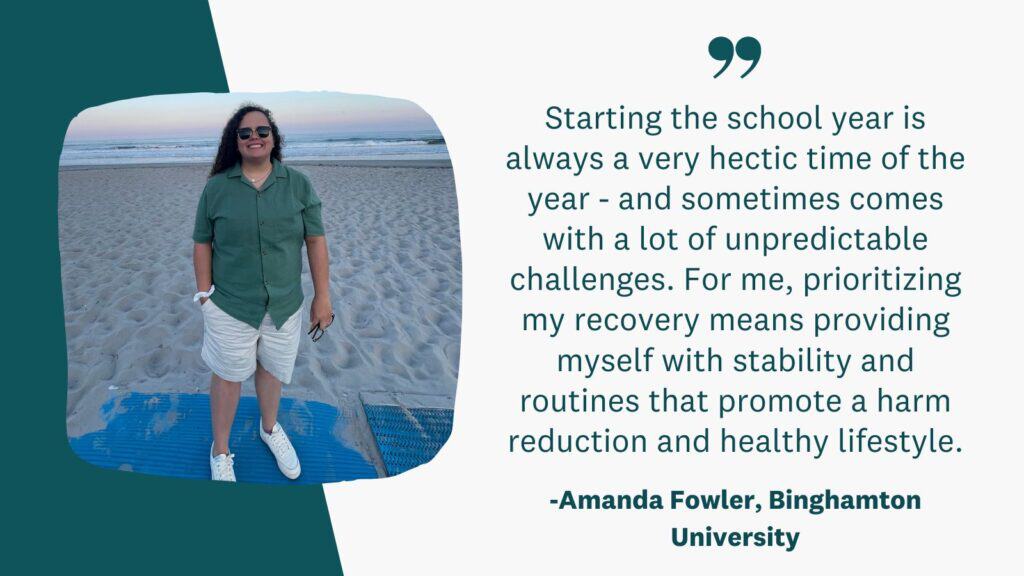Entering college marks a significant chapter in anyone’s life, but for individuals in recovery, it can present a unique set of challenges. The transition to college can be daunting, but with the right strategies and mindset, you can successfully navigate your academic journey while prioritizing your recovery.
Please remember that recovery is a highly individualized journey, and what works for one person might not work for another. As you read through these suggestions, keep in mind the principle of ‘take what you need, leave what you don’t.’
Recovery takes various forms for different individuals, so feel free to lean into the strategies that resonate with you and align with your unique experience.
In general, we have found the following tips to be helpful:
Prioritize Self-Care
- Establish a Routine: Maintain a structured daily routine during your time on campus. Consistency can provide stability and minimize the chances of feeling adrift or overwhelmed.
- Physical Well-Being: Move your body regularly, prioritize balanced nourishment, and ensure adequate sleep. Taking care of your body is essential for maintaining a positive mindset and managing stress. So move your body by walking, dancing, hula hooping, playing ball, or however you like to move.
- Emotional Well-Being: Discover the benefits of mindfulness practices, meditation, and deep breathing exercises, along with the support of therapy, to effectively navigate stress and maintain your sense of centeredness. Incorporate activities that bring you joy and a profound sense of fulfillment into your routine.
Build a Support Network
- Connect with Peers: Seek out local collegiate recovery communities or support groups. These groups can offer valuable connections with individuals who understand the challenges of maintaining recovery during the school year.
- Stay Connected Virtually: While on campus, you may not have access to all of the resources from home. Utilize online resources to stay connected with your existing support network. Attend virtual recovery meetings, check in with recovery mentors, or participate in online forums.
- Family and Friends: Share your journey with trusted friends and family members who can offer support and encouragement. Communicate your needs and boundaries, and lean on them when necessary.
- Communicate with Professors: Don’t hesitate to communicate with your professors about your situation. Many educators are understanding and willing to offer accommodations or support if you’re open about your recovery journey.
Plan Recovery Friendly Activities
- Explore New Hobbies: Use the new year as an opportunity to discover new interests and hobbies that support your purpose from recovery. Consider outdoor activities, art, music, or sports. Engaging in fulfilling activities can help fill the void left by substances.
- Attend Recovery Friendly Events: Look for social events or gatherings on your campus, or in your area, with other people who practice recovery similar to you. Many cities offer alcohol-free alternatives, such as outdoor concerts, sports activities, or community events. Attending these events can help you meet like-minded individuals and create new memories.
Manage Triggers
- Identify Triggers: Reflect on the situations, people, or environments that have triggered you. Understanding your triggers empowers you to develop coping mechanisms and make informed decisions to avoid or navigate them.
- Plan Ahead: If you know you’ll be attending events or social gatherings where the object of your previous addiction may be present, plan your response in advance. Consider having an exit strategy or bringing a friend who supports your recovery along for support.
- Communication and Boundaries: Clearly communicate your boundaries to those around you. Let friends and acquaintances know that you’re practicing recovery and may choose to abstain from certain activities. Surrounding yourself with individuals who respect your choices is crucial.
Embrace Your New Environment
- Set realistic expectations: It’s easy to fall into the trap of perfectionism, especially in a competitive academic environment. Remember that it’s okay to ask for help and seek support when you need it.
- Practice Openness and Honesty: Open conversations can lead to a more supportive environment and help you feel understood. However, only disclose your journey when you’re ready and feel it’s the right time.
- Celebrate Your Achievements:Each step you take towards your recovery and academic success is worth celebrating. Set small milestones and reward yourself for your accomplishments, whether it’s acing an exam, completing a semester, or staying committed to your recovery journey.
- Seek Help When Needed:If you find yourself struggling with your recovery, mental health, or the challenges of college life, don’t hesitate to seek professional help. Campus counseling services, therapists, and support groups can provide valuable guidance and resources.

Returning to college as a person in recovery is undoubtedly a significant achievement. By prioritizing your well-being, building a support network, and implementing healthy coping strategies, you can thrive academically and maintain your recovery journey.
Remember that you’re not alone – there are resources and communities available to help you every step of the way. Stay committed to your goals and take pride in the progress you make on your unique path.



